Haj Amin Al-Husseini
He went from a cleric to a politician and rebelled to liberate his country. Who is Amin Al-Husseini
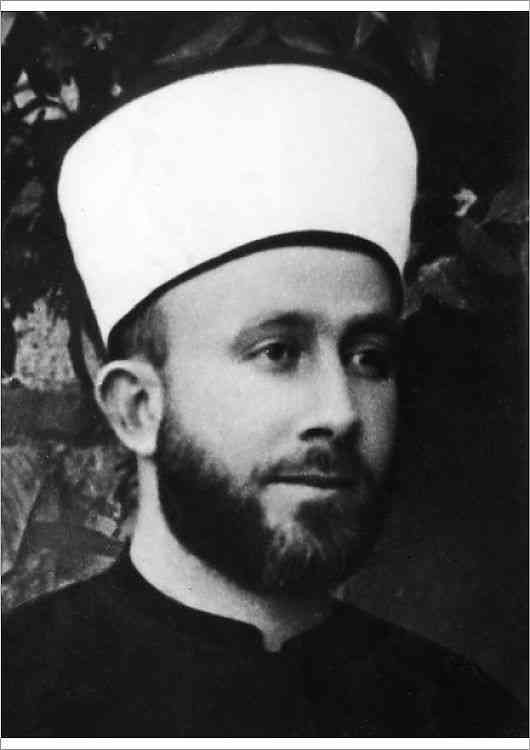
Haj Amin al-Husayni was the most famous person to hold the position of Fatwa in Palestine and was at the same time the head of the Supreme Islamic Council and the head of scholars, and he continued to play an important role in the Arab-Israeli conflict, especially in his early years in the late 1940's and early 1950's. He was born in Jerusalem and spent half of his life as a migrant in many Arab and Western capitals, then died in Lebanon and was buried there.
Birth and Genesis
Muhammad Amin al-Husayni was born in Jerusalem in 1895 to a well-to-do family. His father was interested in science and was keen to enroll his children in the most famous schools and scientific institutes of his era.
Education
He received his initial education in Jerusalem in one of its schools, and his father chose him a number of scholars and writers to give him private lessons at home, then he joined the college of Al-Furir in Jerusalem to learn the French language and after spending two years in it he joined the Al-Azhar Mosque in Cairo and during his studies in Al-Azhar he performed the Hajj pilgrimage with his family and gave him the title of Hajj He has been in need throughout his life. His studies in Egypt and his acquaintance with the leaders of the national movement at the time affected his early interest in politics. In 1915 he joined the Military Academy in Istanbul, where he graduated with the rank of noncommissioned officer.
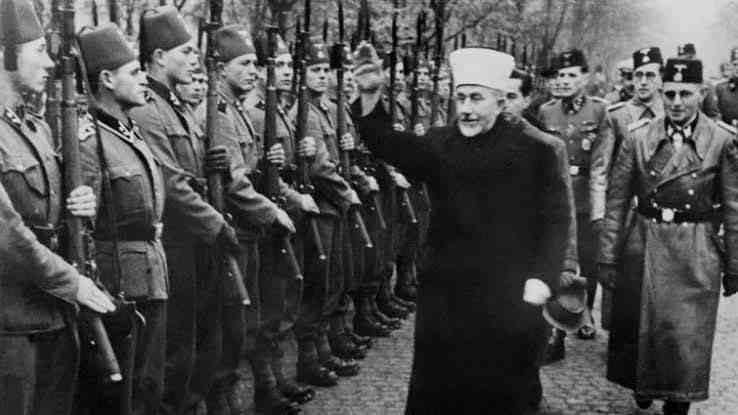
Intellectual Attitudes
Haj Amin Al-Husseini called for combating British rule and Zionist infiltration into Palestine. He had opinions in organizing matters of the judiciary and Sharia courts, and he worked to strengthen Islamic schools and the Endowment Department, and he worked hard to establish a Islamic Islamic Council for Palestine and defined its powers and responsibilities. He also called for the question of Palestine to be considered the cause of all Arabs and the cause of the Islamic world. He was severe in his confrontation with brokers selling Palestinian lands and real estate to the Jews, and he considered those who carry out these sales to be outside the Islamic religion, and it is not permissible to pray on them or bury them in the Muslim cemeteries.
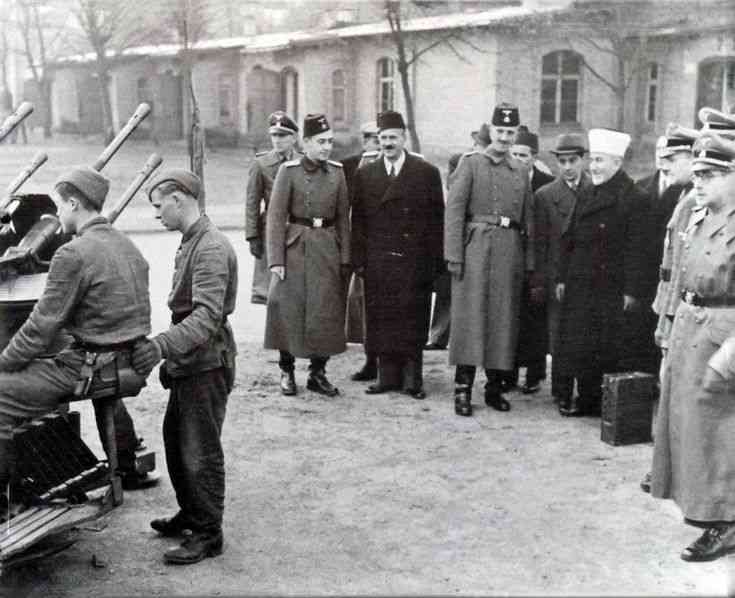
His political life
Al-Hajj Al-Husseini joined the Ottoman army, but after a short time, he chose to work secretly with the Arab revolution. He joined the brigades of Jerusalem and Hebron, then joined the army of Sharif Hussein bin Ali with the aim of establishing an independent Arab state during the First World War.
The struggle against the Jews and the British
Following the issuance of the Balfour Declaration in 1917, al-Husayni decided to return to Jerusalem and began the struggle against the Jewish and British presence there. In 1918, he established the first political organization in modern Palestinian history, the “Arab Club” that worked to organize demonstrations in Jerusalem in 1918 and 1919, and held During that period, the first Arab Palestinian conference was there.
Fleeing to Karak and Damascus
These demonstrations caused his arrest in 1920, but he managed to escape to Karak in southern Jordan and from there to Damascus, so the British government sentenced him in absentia to 15 years imprisonment, but returned and dropped the sentence in the same year after a civilian administration headed by Herbert Samuel replaced the military administration In Jerusalem, he returned to it again.
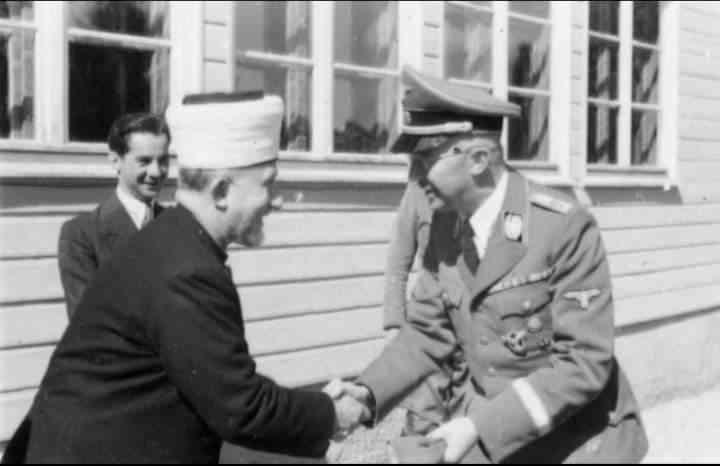
The Mufti of Jerusalem
was elected a general mufti of Jerusalem following the death of Kamel al-Husseini, the former mufti, so the Supreme Islamic Council established to oversee the interests of Muslims in Palestine, and the Council held a large conference in the Al-Aqsa Mosque in 1931 called the first Islamic conference attended by delegates from various Arab and Islamic countries.
Al-Husayni issued a fatwa calling those who sell their land to Jews and brokers who facilitate this process out of the Islamic faith and may not be buried in Muslim graves. Haj Amin has been active in buying lands that are threatened with transfer to the hands of Jews and their annexation to Islamic endowments.
The secret phase
Al-Husayni saw that the Palestinian people were not qualified to wage a military battle in a modern way, so he supported political efforts to solve the Palestinian issue. At the same time, he was working secretly to form military cells, which were considered the first nucleus from which Abd al-Qadir al-Husayni later formed the holy jihad army.
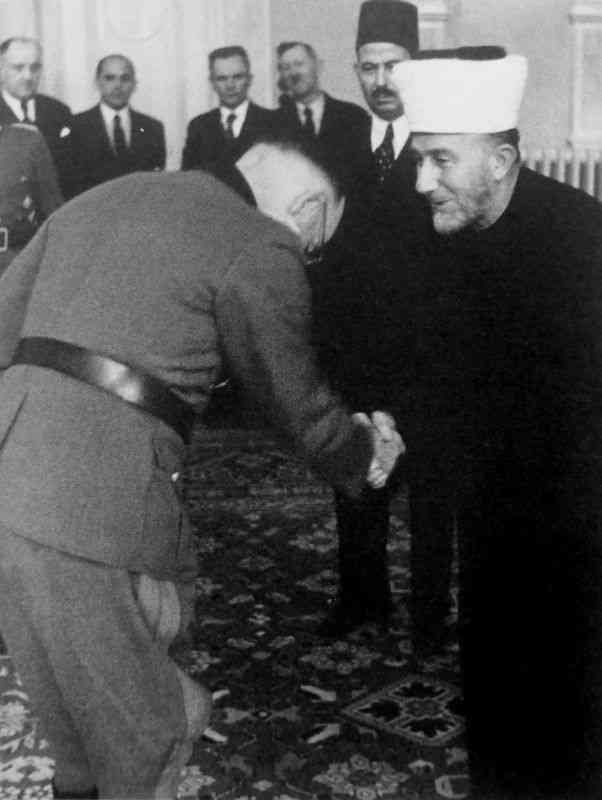
The Higher Arab Authority
After the martyrdom of Izz al-Din al-Qassam in 1935, al-Husayni was chosen as the head of the Higher Arab Organization that was established in the same year, and it included various Palestinian political currents, and he had a prominent role in the 1936 revolution by facilitating the entry of volunteers who came to defend Palestine from various Arab countries.
Taking shelter in the campus
Al-Husayni rejected the project to partition Palestine between Arabs and Jews that was proposed in June 1937 and strongly resisted him. The British authorities worked to arrest him, but he sought refuge in the Noble Sanctuary. In opposing the occupation from inside the campus.
Fleeing to Lebanon After the assassination of the Governor of the Northern District, Andrews, the British High Commissioner issued a decision to dismiss Mufti Amin al-Husseini from his post and considered him responsible for the terrorism that British soldiers are exposed to in Palestine. The British authorities endeavored to arrest him, but he managed to escape to Jaffa and then to Lebanon with a sailboat. The French authorities arrested him but did not extradite him to Britain, and he remained in Lebanon practicing his political activities.
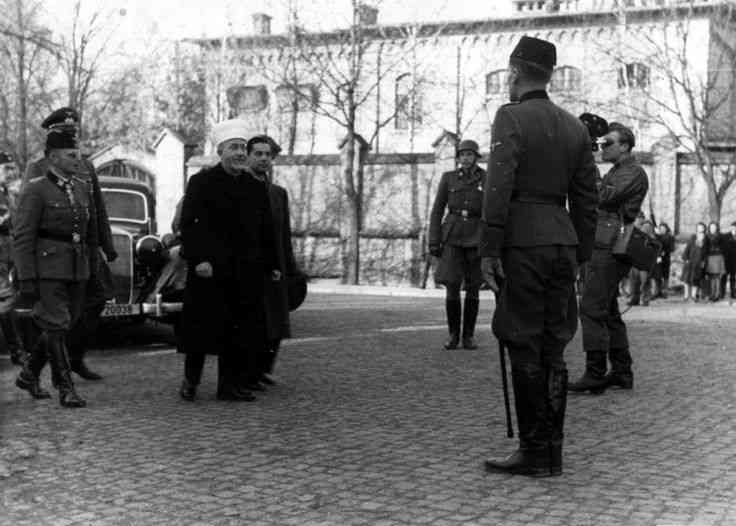
He fled from Lebanon
was forced to flee from Lebanon again after the French-British rapprochement, so he moved between several Arab and Western capitals, first arrived in Iraq and some Mujahideen joined him, and there he supported the revolution of Rashid Ali Al-Kilani, then he was forced to leave after the revolution failed, so he traveled to Turkey and then to Bulgaria and then Germany where he stayed for four years.
The Palestinian Youth Organization
called on some European countries to prosecute him as a war criminal and a supporter of Nazism, and tightened the screws on him, so he was forced to flee to Egypt to lead from there the Arab High Authority again, and to work to support the holy army of jihad, and he took on the task of preparing, coordinating and supplying the Mujahideen. There, he created the Palestinian Youth Organization, in which scout and mobile organizations fused to train them in weapons.
Under house arrest
the British government instructed King Farouk to give orders to impose house arrest on him after his major catastrophe in 1948, and tightened supervision. He remained in that state until the 1952 revolution erupted in Egypt.
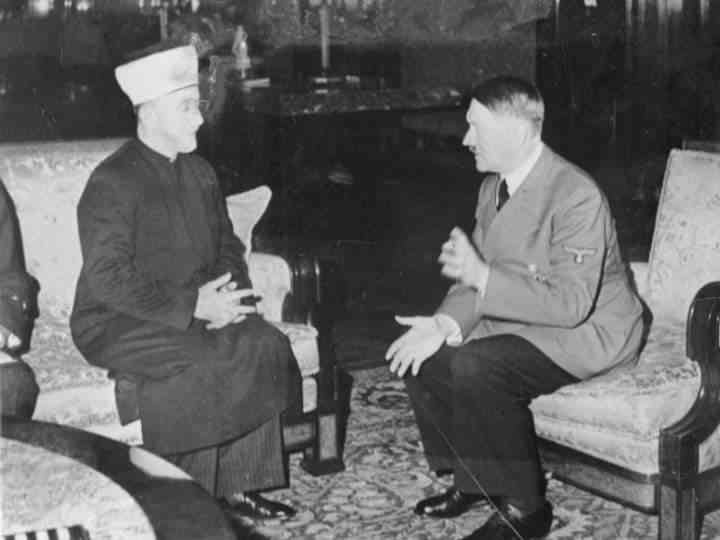
Cooperation with the 1952 revolution.
Al-Husayni cooperated with the leaders of the revolution in transporting weapons secretly to the Sinai and from there to the Palestinian guerrillas at home, and he continued in this situation until in 1959 he decided to migrate to Syria and then to Lebanon.
His death
Al-Haj Muhammad Amin Al-Husseini resumed his political activities, issuing the monthly "Palestine" magazine, and he remained in Lebanon until he died in 1975 and was buried in the martyrs cemetery at the age of 79.

